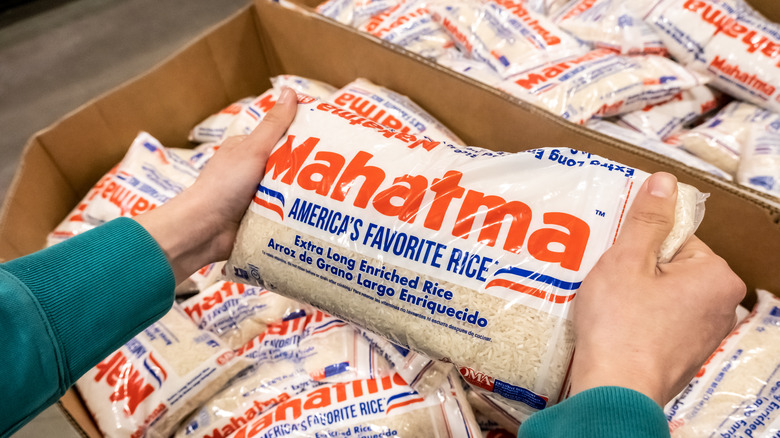The Reason Mahatma Brand Rice Removed Its Mascot
Some brands have noticeably missed the mark when it comes to featuring racial stereotypes. After years of mounting criticism, the pancake mix brand Aunt Jemima finally changed the name of its company to Pearl Miling Company in February 2021, per CNN. The company's logo used to feature a fictionalized Black woman character that many argued stemmed from slavery. In the wake of this, two Atlanta teens noticed another mascot they thought needed to be re-examined, according to 11Alive.
Brother and sister, Rohan and Rani Shrivastava, were looking at the logo on the packaging of Mahatma brand rice and felt that it also depicted a negative stereotype. "It's a white-skinned man who's wearing traditional Indian clothing, like a turban and portja pants, and along with this, he has some kind of wand and it makes it seems like he's some kind of genie or wizard, and it just makes it seem like a joke," they explained.
This prompted the pair to create a change.org petition and contact the company asking them to remove images of the mascot.
Siblings created change
In their change.org petition, the Shrivastava siblings said they believed the logo was offensive and perpetuated a toxic image of those from India. "The Mahatma Rice brand owned by Houston-based Riviana continues to sport a racist logo on their Spicy Yellow Seasoned Rice, Pilaf Seasoned Rice, and Chicken Seasoned Rice," the statement read. "This logo ... is yet another example of cultural appropriation against a minority. Mahatma Rice is grown and packaged in the USA, but it is marketed with a caricature of an Indian man."
Their pushback didn't go unnoticed by the company, who responded to the pair's request and said they would no longer use the image, per 11Alive. The duo's family told the outlet they were proud of their kids for standing up to a big company. "It brought me a ton of pride and joy," said their mom Irma. "They were like, 'Hey let's get in and do something,' and it was amazing to see how their actions created change."

